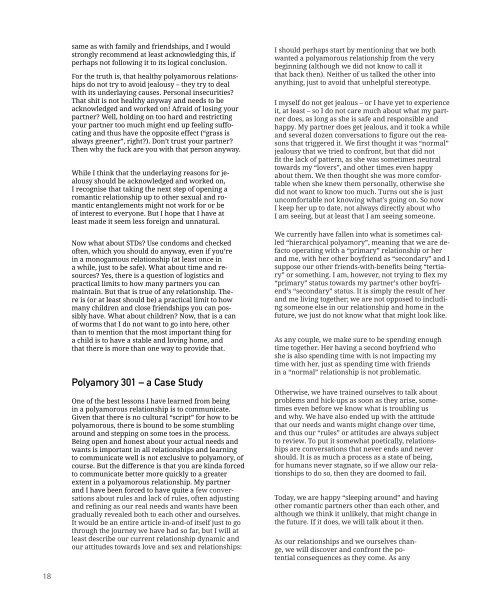Create successful ePaper yourself
Turn your PDF publications into a flip-book with our unique Google optimized e-Paper software.
same as with family and friendships, and I would<br />
strongly recommend at least acknowledging this, if<br />
perhaps not following it to its logical conclusion.<br />
For the truth is, that healthy polyamorous relationships<br />
do not try to avoid jealousy – they try to deal<br />
with its underlaying causes. Personal insecurities?<br />
That shit is not healthy anyway and needs to be<br />
acknowledged and worked on! Afraid of losing your<br />
partner? Well, holding on too hard and restricting<br />
your partner too much might end up feeling suffocating<br />
and thus have the opposite effect (“grass is<br />
always greener”, right?). Don’t trust your partner?<br />
Then why the fuck are you with that person anyway.<br />
While I think that the underlaying reasons for jealousy<br />
should be acknowledged and worked on,<br />
I recognise that taking the next step of opening a<br />
romantic relationship up to other sexual and romantic<br />
entanglements might not work for or be<br />
of interest to everyone. But I hope that I have at<br />
least made it seem less foreign and unnatural.<br />
Now what about STDs? Use condoms and checked<br />
often, which you should do anyway, even if you’re<br />
in a monogamous relationship (at least once in<br />
a while, just to be safe). What about time and resources?<br />
Yes, there is a question of logistics and<br />
practical limits to how many partners you can<br />
maintain. But that is true of any relationship. There<br />
is (or at least should be) a practical limit to how<br />
many children and close friendships you can possibly<br />
have. What about children? Now, that is a can<br />
of worms that I do not want to go into here, other<br />
than to mention that the most important thing for<br />
a child is to have a stable and loving home, and<br />
that there is more than one way to provide that.<br />
Polyamory 301 – a Case Study<br />
One of the best lessons I have learned from being<br />
in a polyamorous relationship is to communicate.<br />
Given that there is no cultural “script” for how to be<br />
polyamorous, there is bound to be some stumbling<br />
around and stepping on some toes in the process.<br />
Being open and honest about your actual needs and<br />
wants is important in all relationships and learning<br />
to communicate well is not exclusive to polyamory, of<br />
course. But the difference is that you are kinda forced<br />
to communicate better more quickly to a greater<br />
extent in a polyamorous relationship. My partner<br />
and I have been forced to have quite a few conversations<br />
about rules and lack of rules, often adjusting<br />
and refining as our real needs and wants have been<br />
gradually revealed both to each other and ourselves.<br />
It would be an entire article in-and-of itself just to go<br />
through the journey we have had so far, but I will at<br />
least describe our current relationship dynamic and<br />
our attitudes towards love and sex and relationships:<br />
I should perhaps start by mentioning that we both<br />
wanted a polyamorous relationship from the very<br />
beginning (although we did not know to call it<br />
that back then). Neither of us talked the other into<br />
anything, just to avoid that unhelpful stereotype.<br />
I myself do not get jealous – or I have yet to experience<br />
it, at least – so I do not care much about what my partner<br />
does, as long as she is safe and responsible and<br />
happy. My partner does get jealous, and it took a while<br />
and several dozen conversations to figure out the reasons<br />
that triggered it. We first thought it was “normal”<br />
jealousy that we tried to confront, but that did not<br />
fit the lack of pattern, as she was sometimes neutral<br />
towards my “lovers”, and other times even happy<br />
about them. We then thought she was more comfortable<br />
when she knew them personally, otherwise she<br />
did not want to know too much. Turns out she is just<br />
uncomfortable not knowing what’s going on. So now<br />
I keep her up to date, not always directly about who<br />
I am seeing, but at least that I am seeing someone.<br />
We currently have fallen into what is sometimes called<br />
“hierarchical polyamory”, meaning that we are defacto<br />
operating with a “primary” relationship or her<br />
and me, with her other boyfriend as “secondary” and I<br />
suppose our other friends-with-benefits being “tertiary”<br />
or something. I am, however, not trying to flex my<br />
“primary” status towards my partner’s other boyfriend’s<br />
“secondary” status. It is simply the result of her<br />
and me living together; we are not opposed to including<br />
someone else in our relationship and home in the<br />
future, we just do not know what that might look like.<br />
As any couple, we make sure to be spending enough<br />
time together. Her having a second boyfriend who<br />
she is also spending time with is not impacting my<br />
time with her, just as spending time with friends<br />
in a “normal” relationship is not problematic.<br />
Otherwise, we have trained ourselves to talk about<br />
problems and hick-ups as soon as they arise, sometimes<br />
even before we know what is troubling us<br />
and why. We have also ended up with the attitude<br />
that our needs and wants might change over time,<br />
and thus our “rules” or attitudes are always subject<br />
to review. To put it somewhat poetically, relationships<br />
are conversations that never ends and never<br />
should. It is as much a process as a state of being,<br />
for humans never stagnate, so if we allow our relationships<br />
to do so, then they are doomed to fail.<br />
Today, we are happy “sleeping around” and having<br />
other romantic partners other than each other, and<br />
although we think it unlikely, that might change in<br />
the future. If it does, we will talk about it then.<br />
As our relationships and we ourselves change,<br />
we will discover and confront the potential<br />
consequences as they come. As any<br />
18


















